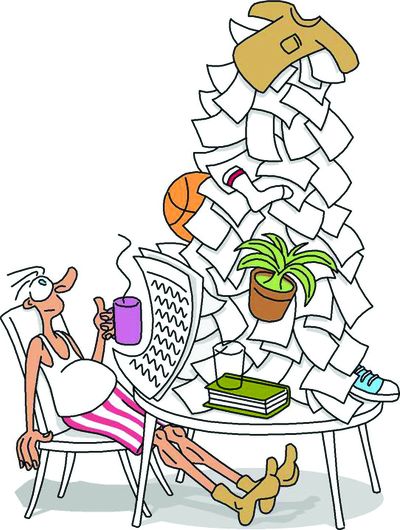Water Cooler: Tips and techniques for efficient cleaning

Even if you have a few select chores you take pleasure in doing, there are few of us who want to spend more time than necessary completing them. Consider a few of these tactics and tips to help cut down your cleaning time.
Use a system. Decide which chores you will complete at which times and how frequently. This helps you build a cleaning routine and the more consistent you are with chores, the less time they will take. When cleaning becomes more automatic, you spend way less mental energy thinking about chores and efficiency naturally develops as your master your cleaning method. It also aids in time management because you will get to know about how long each chore takes and can more easily build it into your busy schedule.
Clean from top to bottom and from left to right when tackling a whole room. This avoids any redundancy in your cleaning. For example, it makes more sense to dust the blinds and shelves before sweeping the floors.
Cleaning a room in the same rotation each time avoids you dirtying anything you already cleaned.
Opt for a squeegee when cleaning glass and windows. A quality squeegee can save you a lot of time compared to polishing mirrors and windows with a glass cleaner and paper towels. It also saves money in the long run because you can use a drop of soap in a bucket of warm water instead of cleaners. Use a rag to wash the window with soapy water, then immediately squeegee it off, working from top to bottom and wiping the blade between strokes.
Use a caddy for your cleaning products. This allows you to take what you need with you, instead of walking to and from the storage to grab supplies. It also keeps all your products at the ready and in sight so you can keep track of what you already have and what supplies are getting low.
Be proactive. Keeping on top of messes and build-up prevents things from getting harder to clean later.
Clear clutter before deep cleaning. Cleaning goes much quicker when you don’t have to work around obstacles.
Use a feather duster for quick weekly or biweekly dusting around the house. This makes for quick work as it prevents dust build up so you won’t need to use a moist cloth or a spray. For built-up dust, use a vacuum cleaner or cloth.
Battle bathroom mold with hydrogen peroxide. Spray it on mold and let sit for 5 to 10 minutes. Wipe and repeat until the mold is gone. Hydrogen peroxide works well on porous surfaces like grout and can help kill the mold. Wipe the area thoroughly to ensure removal of any remaining spores.
Use white vinegar and a gentle cloth to remove mineral deposits. The vinegar will break down the deposit and then you can wipe if off without scratching any plumbing fixtures. If the fixture has so much build up that the vinegar needs to soak it for a while, fill a plastic bag with vinegar and attach it to the faucet head with a rubber band, making sure that the deposits are submerged.
Use mineral oil to keep sinks cleaner longer. After cleaning a sink, pour a little mineral oil on a cloth and wipe the sink. Do this about once a week. The mineral oil helps repel water and makes any built-up gunk easier to wipe off.
Effortlessly clean your microwave by heating a bowl or cup of water first. The moisture disperses and soaks into baked-on food. The food then loosens up and can be wiped off with a damp cloth.